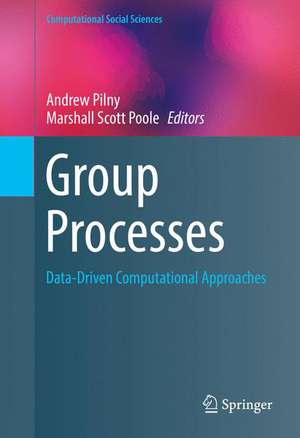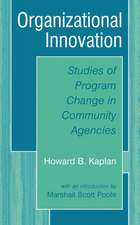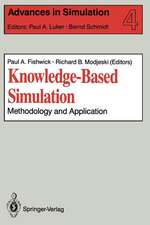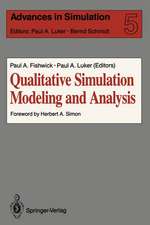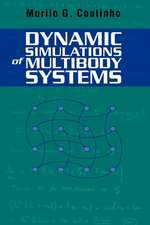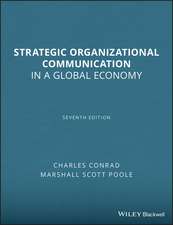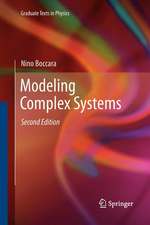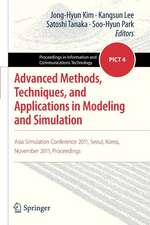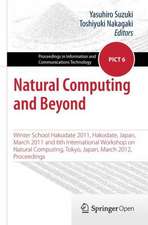Group Processes: Data-Driven Computational Approaches: Computational Social Sciences
Editat de Andrew Pilny, Marshall Scott Pooleen Limba Engleză Hardback – 15 mar 2017
This volume introduces a series of different data-driven computational methods for analyzing group processes through didactic and tutorial-based examples. Group processes are of central importance to many sectors of society, including government, the military, health care, and corporations. Computational methods are better suited to handle (potentially huge) group process data than traditional methodologies because of their more flexible assumptions and capability to handle real-time trace data.
Indeed, the use of methods under the name of computational social science have exploded over the years. However, attention has been focused on original research rather than pedagogy, leaving those interested in obtaining computational skills lacking a much needed resource. Although the methods here can be applied to wider areas of social science, they are specifically tailored to group process research.
A number of data-driven methodsadapted to group process research are demonstrated in this current volume. These include text mining, relational event modeling, social simulation, machine learning, social sequence analysis, and response surface analysis. In order to take advantage of these new opportunities, this book provides clear examples (e.g., providing code) of group processes in various contexts, setting guidelines and best practices for future work to build upon.
This volume will be of great benefit to those willing to learn computational methods. These include academics like graduate students and faculty, multidisciplinary professionals and researchers working on organization and management science, and consultants for various types of organizations and groups.
| Toate formatele și edițiile | Preț | Express |
|---|---|---|
| Paperback (1) | 755.18 lei 6-8 săpt. | |
| Springer International Publishing – 7 aug 2018 | 755.18 lei 6-8 săpt. | |
| Hardback (1) | 761.44 lei 6-8 săpt. | |
| Springer International Publishing – 15 mar 2017 | 761.44 lei 6-8 săpt. |
Din seria Computational Social Sciences
- 15%
 Preț: 649.39 lei
Preț: 649.39 lei - 18%
 Preț: 964.54 lei
Preț: 964.54 lei - 15%
 Preț: 643.34 lei
Preț: 643.34 lei - 15%
 Preț: 640.88 lei
Preț: 640.88 lei - 20%
 Preț: 338.16 lei
Preț: 338.16 lei -
 Preț: 390.63 lei
Preț: 390.63 lei -
 Preț: 395.47 lei
Preț: 395.47 lei - 20%
 Preț: 662.11 lei
Preț: 662.11 lei - 20%
 Preț: 618.05 lei
Preț: 618.05 lei - 20%
 Preț: 760.97 lei
Preț: 760.97 lei - 20%
 Preț: 628.79 lei
Preț: 628.79 lei - 20%
 Preț: 649.93 lei
Preț: 649.93 lei - 15%
 Preț: 643.48 lei
Preț: 643.48 lei - 18%
 Preț: 1117.34 lei
Preț: 1117.34 lei - 20%
 Preț: 1169.47 lei
Preț: 1169.47 lei -
 Preț: 432.12 lei
Preț: 432.12 lei -
 Preț: 393.13 lei
Preț: 393.13 lei - 18%
 Preț: 887.38 lei
Preț: 887.38 lei -
 Preț: 383.93 lei
Preț: 383.93 lei - 20%
 Preț: 241.67 lei
Preț: 241.67 lei - 15%
 Preț: 523.07 lei
Preț: 523.07 lei -
 Preț: 428.07 lei
Preț: 428.07 lei - 15%
 Preț: 693.06 lei
Preț: 693.06 lei -
 Preț: 487.75 lei
Preț: 487.75 lei - 20%
 Preț: 1166.19 lei
Preț: 1166.19 lei - 15%
 Preț: 696.02 lei
Preț: 696.02 lei - 20%
 Preț: 1156.62 lei
Preț: 1156.62 lei - 25%
 Preț: 470.31 lei
Preț: 470.31 lei
Preț: 761.44 lei
Preț vechi: 951.80 lei
-20% Nou
Puncte Express: 1142
Preț estimativ în valută:
145.70€ • 152.12$ • 120.59£
145.70€ • 152.12$ • 120.59£
Carte tipărită la comandă
Livrare economică 05-19 aprilie
Preluare comenzi: 021 569.72.76
Specificații
ISBN-13: 9783319489407
ISBN-10: 3319489402
Pagini: 206
Ilustrații: VI, 206 p. 80 illus., 59 illus. in color.
Dimensiuni: 155 x 235 x 13 mm
Greutate: 0.48 kg
Ediția:1st ed. 2017
Editura: Springer International Publishing
Colecția Springer
Seria Computational Social Sciences
Locul publicării:Cham, Switzerland
ISBN-10: 3319489402
Pagini: 206
Ilustrații: VI, 206 p. 80 illus., 59 illus. in color.
Dimensiuni: 155 x 235 x 13 mm
Greutate: 0.48 kg
Ediția:1st ed. 2017
Editura: Springer International Publishing
Colecția Springer
Seria Computational Social Sciences
Locul publicării:Cham, Switzerland
Cuprins
Introduction.- Response Surface Models to Analyze Nonlinear Group Phenomena.- Causal Inference using Bayesian Network.- A Relational Event Approach to Modeling Behavioral Dynamics.- Text Mining Tutorial.- Sequential Synchronization Analysis.- Group Analysis using Machine Learning Techniques.- Simulation and Virtual Experimentation: Grounding with Empirical Data.
Notă biografică
Andrew Pilny (Ph.D., University of Illinois) is an assistant professor in the Department of Communication at the University of Kentucky. His main research areas concern the development of effective organizing social systems and structures. His research has been applied to nonprofit organizations, social movement groups, work teams, and dark organizations. Andy also specializes in social network analysis.
Marshall Scott Poole (Ph.D., University of Wisconsin) is the David L. Swanson Professor of Communication, Senior Research Scientist at the National Center for Supercomputing Applications, and Director of I-CHASS: The Institute for Computing in the Humanities, Arts, and Social Sciences at the University of Illinois. He is also a CCSS Fellow in the Organization Science Program at Vrije University in Amsterdam, Netherlands. His research interests include group and organizational communication, information and communication technologies, collaboration, organizational change and innovation, and theory construction.
Marshall Scott Poole (Ph.D., University of Wisconsin) is the David L. Swanson Professor of Communication, Senior Research Scientist at the National Center for Supercomputing Applications, and Director of I-CHASS: The Institute for Computing in the Humanities, Arts, and Social Sciences at the University of Illinois. He is also a CCSS Fellow in the Organization Science Program at Vrije University in Amsterdam, Netherlands. His research interests include group and organizational communication, information and communication technologies, collaboration, organizational change and innovation, and theory construction.
Textul de pe ultima copertă
This volume introduces a series of different data-driven computational methods for analyzing group processes through didactic and tutorial-based examples. Group processes are of central importance to many sectors of society, including government, the military, health care, and corporations. Computational methods are better suited to handle (potentially huge) group process data than traditional methodologies because of their more flexible assumptions and capability to handle real-time trace data.
Indeed, the use of methods under the name of computational social science have exploded over the years. However, attention has been focused on original research rather than pedagogy, leaving those interested in obtaining computational skills lacking a much needed resource. Although the methods here can be applied to wider areas of social science, they are specifically tailored to group process research.
A number of data-driven methodsadapted to group process research are demonstrated in this current volume. These include text mining, relational event modeling, social simulation, machine learning, social sequence analysis, and response surface analysis. In order to take advantage of these new opportunities, this book provides clear examples (e.g., providing code) of group processes in various contexts, setting guidelines and best practices for future work to build upon.
This volume will be of great benefit to those willing to learn computational methods. These include academics like graduate students and faculty, multidisciplinary professionals and researchers working on organization and management science, and consultants for various types of organizations and groups.
Caracteristici
Provides up-to-date and innovative computational approaches that are adapted to the inputs, dynamics, and outcomes of group processes Teaches the use of each method in practice, preparing readers for their future research Contributes to existing and new theories of group processes Brings together original research from leading experts, advancing new approaches to the field Includes supplementary material: sn.pub/extras
